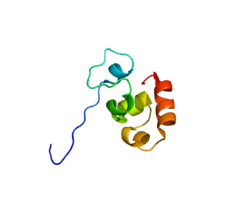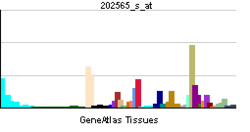SVIL
Supervillin is a protein that in humans is encoded by the SVIL gene.[3][4]
Function
This gene encodes a bipartite protein with distinct amino- and carboxy-terminal domains. The amino-terminus contains nuclear localization signals and the carboxy-terminus contains numerous consecutive sequences with extensive similarity to proteins in the gelsolin family of actin-binding proteins, which cap, nucleate, and/or sever actin filaments.[5] The gene product is tightly associated with both actin filaments and plasma membranes, suggesting a role as a high-affinity link between the actin cytoskeleton and the membrane. Its function may include recruitment of actin and other cytoskeletal proteins into specialized structures at the plasma membrane and in the nuclei of growing cells. Two transcript variants encoding different isoforms of supervillin have been described.[4]
Interactions
SVIL has been shown to interact with Androgen receptor.[6]
References
- ↑ "Human PubMed Reference:".
- ↑ "Mouse PubMed Reference:".
- ↑ Pestonjamasp KN, Pope RK, Wulfkuhle JD, Luna EJ (Dec 1997). "Supervillin (p205): A novel membrane-associated, F-actin-binding protein in the villin/gelsolin superfamily". The Journal of Cell Biology. 139 (5): 1255–69. doi:10.1083/jcb.139.5.1255. PMC 2140202
 . PMID 9382871.
. PMID 9382871. - 1 2 "Entrez Gene: SVIL supervillin".
- ↑ Ghoshdastider U, Popp D, Burtnick LD, Robinson RC (Nov 2013). "The expanding superfamily of gelsolin homology domain proteins". Cytoskeleton. 70 (11): 775–95. doi:10.1002/cm.21149. PMID 24155256.
- ↑ Ting HJ, Yeh S, Nishimura K, Chang C (Jan 2002). "Supervillin associates with androgen receptor and modulates its transcriptional activity". Proceedings of the National Academy of Sciences of the United States of America. 99 (2): 661–6. Bibcode:2002PNAS...99..661T. doi:10.1073/pnas.022469899. PMC 117362
 . PMID 11792840.
. PMID 11792840.
Further reading
- Pope RK, Pestonjamasp KN, Smith KP, Wulfkuhle JD, Strassel CP, Lawrence JB, Luna EJ (Sep 1998). "Cloning, characterization, and chromosomal localization of human superillin (SVIL)". Genomics. 52 (3): 342–51. doi:10.1006/geno.1998.5466. PMID 9867483.
- Wulfkuhle JD, Donina IE, Stark NH, Pope RK, Pestonjamasp KN, Niswonger ML, Luna EJ (Jul 1999). "Domain analysis of supervillin, an F-actin bundling plasma membrane protein with functional nuclear localization signals". Journal of Cell Science. 112 ( Pt 13) (13): 2125–36. PMID 10362542.
- Kim M, Jiang LH, Wilson HL, North RA, Surprenant A (Nov 2001). "Proteomic and functional evidence for a P2X7 receptor signalling complex". The EMBO Journal. 20 (22): 6347–58. doi:10.1093/emboj/20.22.6347. PMC 125721
 . PMID 11707406.
. PMID 11707406.
- Ting HJ, Yeh S, Nishimura K, Chang C (Jan 2002). "Supervillin associates with androgen receptor and modulates its transcriptional activity". Proceedings of the National Academy of Sciences of the United States of America. 99 (2): 661–6. Bibcode:2002PNAS...99..661T. doi:10.1073/pnas.022469899. PMC 117362
 . PMID 11792840.
. PMID 11792840.
- Oh SW, Pope RK, Smith KP, Crowley JL, Nebl T, Lawrence JB, Luna EJ (Jun 2003). "Archvillin, a muscle-specific isoform of supervillin, is an early expressed component of the costameric membrane skeleton". Journal of Cell Science. 116 (Pt 11): 2261–75. doi:10.1242/jcs.00422. PMID 12711699.
- Chen Y, Takizawa N, Crowley JL, Oh SW, Gatto CL, Kambara T, Sato O, Li XD, Ikebe M, Luna EJ (Nov 2003). "F-actin and myosin II binding domains in supervillin". The Journal of Biological Chemistry. 278 (46): 46094–106. doi:10.1074/jbc.M305311200. PMID 12917436.
- Beausoleil SA, Jedrychowski M, Schwartz D, Elias JE, Villén J, Li J, Cohn MA, Cantley LC, Gygi SP (Aug 2004). "Large-scale characterization of HeLa cell nuclear phosphoproteins". Proceedings of the National Academy of Sciences of the United States of America. 101 (33): 12130–5. Bibcode:2004PNAS..10112130B. doi:10.1073/pnas.0404720101. PMC 514446
 . PMID 15302935.
. PMID 15302935.
- Jin J, Smith FD, Stark C, Wells CD, Fawcett JP, Kulkarni S, Metalnikov P, O'Donnell P, Taylor P, Taylor L, Zougman A, Woodgett JR, Langeberg LK, Scott JD, Pawson T (Aug 2004). "Proteomic, functional, and domain-based analysis of in vivo 14-3-3 binding proteins involved in cytoskeletal regulation and cellular organization". Current Biology. 14 (16): 1436–50. doi:10.1016/j.cub.2004.07.051. PMID 15324660.
- Olsen JV, Blagoev B, Gnad F, Macek B, Kumar C, Mortensen P, Mann M (Nov 2006). "Global, in vivo, and site-specific phosphorylation dynamics in signaling networks". Cell. 127 (3): 635–48. doi:10.1016/j.cell.2006.09.026. PMID 17081983.



 . PMID 9382871.
. PMID 9382871. . PMID 11792840.
. PMID 11792840. . PMID 11707406.
. PMID 11707406. . PMID 11792840.
. PMID 11792840. . PMID 15302935.
. PMID 15302935.